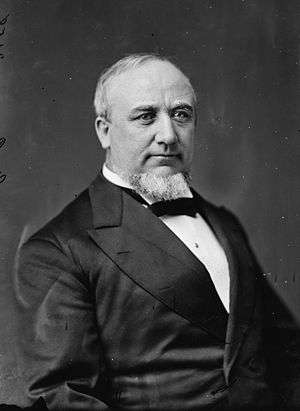Howard Cannon
| Howard Cannon | |
|---|---|
 | |
| United States Senator from Nevada | |
|
In office January 3, 1959 – January 3, 1983 | |
| Preceded by | George W. Malone |
| Succeeded by | Chic Hecht |
| Personal details | |
| Born |
Howard Walter Cannon January 26, 1912 St. George, Utah |
| Died |
March 5, 2002 (aged 90) Las Vegas, Nevada |
| Political party | Democratic |
| Spouse(s) | Dorothy Pace Cannon |
| Children | 2 |
| Profession | Attorney |
| Religion | The Church of Jesus Christ of Latter-day Saints (Mormon) |
Howard Walter Cannon (January 26, 1912 – March 5, 2002) was an American politician. He served as a United States Senator from Nevada from 1959 until 1983 as a member of the Democratic Party.
Early life, education, and early political career
Cannon was born in Saint George, Utah. He graduated from Dixie State College and then Arizona state teacher's college and the University of Arizona law school. He became a lawyer in Arizona, Nevada and Utah, being accepted to the bar in all three states. In World War II he served as a troop carrier pilot in the United States Army Air Corps and its subsequent incarnation as the United States Army Air Forces. Assigned to the European theater, he dropped paratroopers at Saint-Come-du-Mont, Normandy and during the following combat mission in September 1944 was shot down over the Netherlands. He spent 42 days trying to return to the Allied lines with the assistance of the Dutch underground. Released from active duty in 1946, he joined the Army Air Forces Reserve until 1947 when he transitioned to the Air Force Reserve concurrent with the establishment of the U.S. Air Force as a separate service. Continuing to fly in the Air Force Reserve, he achieved command pilot status and ultimately retired from the Air Force Reserve with the rank of Major General. His military decorations included the Silver Star, Legion of Merit, Distinguished Flying Cross, the Purple Heart and the Air Medal (3 awards).[1] In 1949 Cannon was elected city attorney of Las Vegas, Nevada and reelected three times.
U.S. Senate
Elections
In 1956, Cannon ran for the U.S. House of Representatives to succeed Republican incumbent C. Clifton Young, who ran for the U.S. Senate, but lost the Democratic primary to former Congressman Walter Baring, who then won the general election. In 1958, he was elected to the United States Senate, unseating Republican Senator George W. Malone with 58% of the vote. Cannon was nearly defeated in his first re-election bid in 1964, holding off Republican Lieutenant Governor Paul Laxalt in one of the closest Senate elections ever. On election night, one of the networks actually projected that Cannon had lost, but several precincts didn't report in until the next morning and gave Cannon enough votes to secure a second term. Ultimately, Cannon only won by 48 votes. He likely would not have won had it not been for Lyndon Johnson's presence atop the ticket; Johnson easily carried the state as part of his 44-state landslide that year. Cannon was re-elected with far less difficulty in 1970, defeating then Washoe County District Attorney William Raggio. He also won re-election easily over former Congressman David Towell in 1976.
In the early 1980s, Cannon was ensnared in a scandal when Teamsters president Roy L. Williams was indicted by federal prosecutors for attempting to bribe Cannon in exchange for using his influence to block a bill deregulating the trucking industry. He testified that he did not know Williams or his associates and denied being offered a bribe, but other witnesses corroborated the story and Williams was convicted. Cannon was challenged in the 1982 Democratic primary by U.S. Representative Jim Santini, winning by about 4,500 votes, but lost the general election to Republican nominee Chic Hecht, a former state senator and businessman.[2]
Tenure
In 1964 Cannon voted for the Civil Rights Act. In the Senate, he was known as a moderate in the Democratic Party. In 1981, he was the recipient of the Tony Jannus Award for his distinguished contributions to commercial aviation. Cannon retired from politics and died in Las Vegas in 2002 at the age of ninety. Senator Cannon was also in attendance at the final performance of Diana Ross and the Supremes in January, 1970.
Committee assignments
He had an interest in the rules and administration of the Congress, serving as chairman of several committees on that subject, including the rules committee and the inaugural arrangements committee.
Honors
- The passenger terminal at Reno-Tahoe International Airport is named after him.[3]
- The Cannon Center for Survey Research is named after him.[4]
- The Howard W. Cannon Aviation Museum, located in Las Vegas's McCarran International Airport, is also named after him. [5]
References
- ↑ http://www.arlingtoncemetery.net/hwcannon.htm
- ↑ Stout, David (7 March 2002). "Howard Cannon, 90, Senator Who Served Four Terms, Dies". New York Times. Retrieved 7 October 2014.
- ↑ HotelsByCity.net listing
- ↑
- ↑
External links
- United States Congress. "Howard Cannon (id: C000120)". Biographical Directory of the United States Congress.
| United States Senate | ||
|---|---|---|
| Preceded by George W. Malone |
U.S. Senator (Class 1) from Nevada 1959–1983 Served alongside: Alan Bible, Paul Laxalt |
Succeeded by Chic Hecht |
| Political offices | ||
| Preceded by B. Everett Jordan North Carolina |
Chairman of the Senate Rules Committee 1973–1978 |
Succeeded by Claiborne Pell Rhode Island |
| Preceded by Warren Magnuson Washington |
Chairman of the Senate Commerce, Science and Transportation Committee 1978–1981 |
Succeeded by Bob Packwood Oregon |

